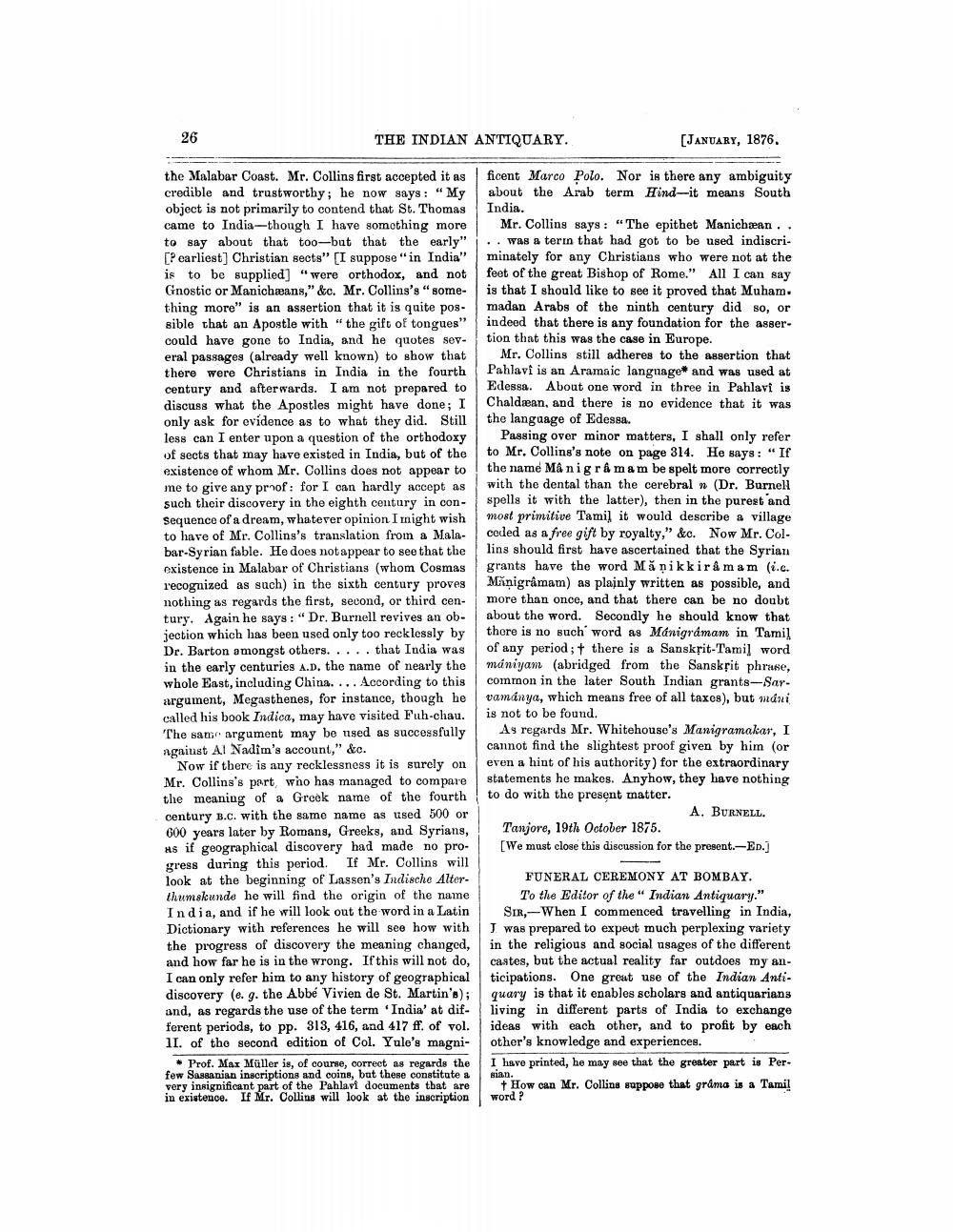________________
26
THE INDIAN ANTIQUARY.
[JANUARY, 1876.
the Malabar Coast. Mr. Collins first accepted it as ficent Marco Polo. Nor is there any ambiguity credible and trustworthy; he now says: "My about the Arab term Hind-it means South object is not primarily to contend that St. Thomas India. came to India--though I have something more Mr. Collins says: "The epithet Manichæan.. to say about that too-but that the early" .. was a term that had got to be used indiscri[Pearliest] Christian sects" (I suppose" in India" minately for any Christians who were not at the is to be supplied) were orthodox, and not feet of the great Bishop of Rome." All I can say Gnostic or Manichæans," &c. Mr. Collins's "some- is that I should like to see it proved that Muham. thing more" is an assertion that it is quite pos- madan Arabs of the ninth century did so, or sible that an Apostle with the gift of tongues" indeed that there is any foundation for the assercould have gone to India, and he quotes sev. tion that this was the case in Europe. eral passages (already well known) to show that Mr. Collins still adheres to the assertion that there were Christians in India in the fourth Pahlavi is an Aramaic langnage and was used at century and afterwards. I am not prepared to Edessa. About one word in three in Pahlavi is discuss what the Apostles might have done; I Chaldæan, and there is no evidence that it was only ask for evidence as to what they did. Still the language of Edessa. less can I enter upon a question of the orthodoxy Passing over minor matters, I shall only refer of sects that may have existed in India, but of the to Mr. Collins's note on page 314. He says: "If existence of whom Mr. Collins does not appear to the name Manigramam be spelt more correctly me to give any proof: for I can hardly accept as
with the dental than the cerebral (Dr. Burnell such their discovery in the eighth century in con- spells it with the latter), then in the purest and Sequence of a dream, whatever opinion I night wish
most primitive Tamil it would describe a village to have of Mr. Collins's translation from a Mala- ceded as a free gift by royalty," &c. Now Mr. Col. bar-Syrian fable. He does not appear to see that the lins should first have ascertained that the Syrian oxistence in Malabar of Christians (whom Cosmas grants have the word Monikkir & mam (6.c. l'ecognized as such) in the sixth century proves Mănigramam) as plainly written as possible, and nothing as regards the first, second, or third cen- more than once, and that there can be no doubt tury. Again he says: "Dr. Burnell revives an ob- about the word. Secondly he should know that jection which has been used only too recklessly by there is no such word as Manigramam in Tamil Dr. Barton amongst others. . . . . that India was of any period; there is a Sanskrit Tamil word in the early centuries A.D. the name of nearly the
mániyam (abridged from the Sanskrit phrase, whole East, including China. ... According to this common in the later South Indian grants-Sarargument, Megasthenes, for instance, though he vaminya, which means free of all taxes), but dui called his book Indica, may have visited Fuh-chau. is not to be found. The same argument may be used as successfully As regards Mr. Whitehouse's Manigramakar, I against Al Nadim's account," &c.
cannot find the slightest proof given by him (or Now if there is any recklessness it is surely on
even a hint of his authority) for the extraordinary Mr. Collins's part who has managed to compare
statements he makes. Anyhow, they have nothing the meaning of a Greek name of the fourth to do with the present matter. century B.C. with the same name as used 500 or
A. BURNELL. 600 years later by Romans, Greeks, and Syrians,
Tanjore, 19th October 1875. as if geographical discovery had made no pro- [We must close this discussion for the present.-ED.) gress during this period. If Mr. Collins will look at the beginning of Lassen's Indische Alter
FUNERAL CEREMONY AT BOMBAY. thumskunde he will find the origin of the name To the Editor of the "Indian Antiquary." India, and if he will look out the word in a Latin | SiR-When I commenced travelling in India, Dictionary with references he will see how with I was prepared to expect much perplexing variety the progress of discovery the meaning changed, in the religious and social usages of the different and how far he is in the wrong. If this will not do, castes, but the actual reality far outdoes my anI can only refer him to any history of geographical ticipations. One great use of the Indian Antidiscovery (e. g. the Abbé Vivien de St. Martin's); quary is that it enables scholars and antiquarians ond, as regards the use of the term 'India' at dif- living in different parts of India to exchange ferent periods, to pp. 813, 416, and 417 ff. of vol. ideas with each other, and to profit by each 11. of the second edition of Col. Yule's magni- other's knowledge and experiences.
• Prof. Max Müller is, of course, correct as regards the I have printed, he may see that the greater part is Per. few Sassanian inscriptions and coins, but these constitute a very insignificant part of the Pahlavi documents that are How can Mr. Collins suppose that gráma is a Tamil in existence. If Mr. Collins will look at the inscription word ?




